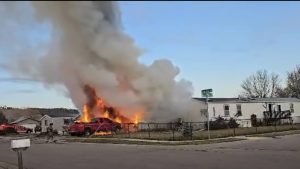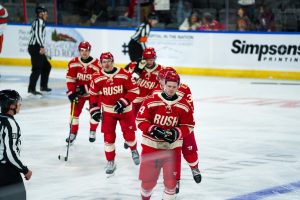As an ECHL team the Rapid City Rush are consistently in a rebuilding mode. Very few elements of the previous seasons team return to the ice the following year. In the case of the Rapid City Rush not only did most of the playing roster change but the person who leads the team in the position of general manager and head coach also switched up.
It is a hefty responsibility to come into a less than stellar situation and be expected to fix issues that existed before your time, while the machine is running. This is exactly what Dave Smith did.
The new era of Rush hockey has arrived.
As with any transformation it is not clean or easy . Growth is messy and hard to watch. Dave Smith’s honest transparency about the flaws the Rush are encountering in the start of the season are both uncomfortable and welcome.
Recognizing a problem is the first step to correction. Coach Smith has done this with his acknowledgment of the abysmal state of Rapid City’s power play.
The power play is not a new problem for the Rush. Previous seasons have also seen underwhelming effort in the special teams department.
The addition of video coach Austin Washkurak shows the forward thinking of Coach Smith. This crucial element of modern-day coaching could be a vital tool for Rapid City to use in order to turn the power play around.
Hypothetically, a change in strategy focusing on simplicity over systems could bring immediate results. A focus on basic principles over long view game structure would allow players to more organically read and react to plays on the ice.
A back to basic mentality of developing skills like support, passing accuracy, deception and puck protection in tight spaces could benefit the Rush. These skills could transfer directly to effective powerplay execution with less risk of turnovers.
Practice drills could also emphasize looking “off passes” and faking shots. These abilities to manipulate penalty killers could make the power play less predictable while improving the teams peripheral awareness on the ice
Implementing a mandatory back check rule in power play drills can instill defensive habits while in offensive play. Back checking is a proactive defensive strategy used to disrupt the opponent’s attack, apply pressure and prevent scoring chances.
Being beat on the power play so often may have a negative effect on the morale of the team. It is imperative for the coaches and players to focus on small wins during practice, give each other positive reinforcement and review video of successful power plays.
Video analysis of the opponents penalty kill could also help the Rush learn how to exploit specific weaknesses in their opponents and create strategies for positive advantages.
In a perfect world all these hypothetical changes could take effect immediately, however this is not the case.
The ECHL, or the road warriors of hockey, have a demanding travel schedule which can directly impact practice time and on ice execution.
Long bus rides, lack of home ice advantage, and uncertain schedules can affect even the most seasoned veteran.
One of the contentious issues in the continuing CBA negotiations is the demanding travel schedule, lack of rest periods, and general malaise of being on the road. These issue are also experienced by the members of the Rush.
Limited ice time between travel games may mean that a simple practice of fundamentals gets squeezed out.
The power play is a unit that requires chemistry and on ice repetition in order to execute properly. If players are only reviewing video and having quick low intensity practice sessions on ice game performances will suffer.
So how can Rapid City counter these obstacles?
The concept of keeping it simple and bringing back the fundamentals of play. This tactic clarifies each player’s role reducing mental errors and increasing confidence.
With only 17% of the season played coaches Smith, Drikos and Washkurak have ample time to reformat their systems on the power play and regain that confidence that will take the Rapid City Rush into the 2026 Kelly Cup playoffs.





